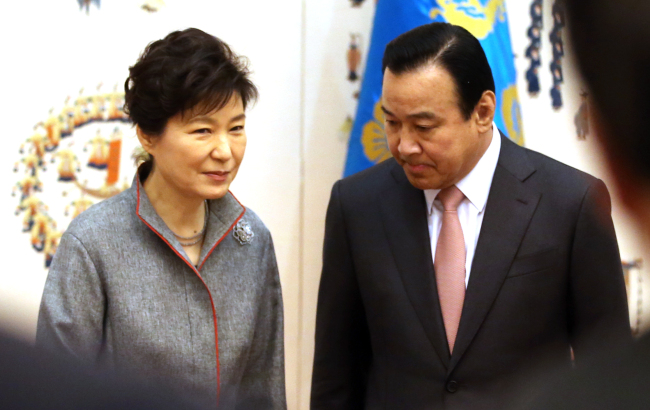[Newsmaker] New P.M. faces tough task of restoring trust
By Korea HeraldPublished : Feb. 17, 2015 - 17:32
When new Prime Minister Lee Wan-koo takes office Tuesday, he will face the herculean task of winning back the public trust he lost through reports of conscription evasion, property speculation and intimidation of journalists.
In South Korea, prime ministers are often limited to nominal roles, with executive power centered in the presidential office.
But Lee faces daunting challenges as he is taking office at a critical time, with the Park Geun-hye government seeking a way out from a deepening political crisis and pushing for her reform drives.
Critics say that Park likely intends to use Lee as the chief mascot for her policies, and as a channel of communication with the main parties.
In South Korea, prime ministers are often limited to nominal roles, with executive power centered in the presidential office.
But Lee faces daunting challenges as he is taking office at a critical time, with the Park Geun-hye government seeking a way out from a deepening political crisis and pushing for her reform drives.
Critics say that Park likely intends to use Lee as the chief mascot for her policies, and as a channel of communication with the main parties.

“That would shield the president from direct criticism for policy failures,” said Kyung Hee University professor Yoon Seong-yi.
“What (Park) will do now with Lee remains up in the air, though,” he said, in reference to Lee’s less-than-stellar performance at his confirmation hearing.
But as recently as 26 days ago, when Park named Lee as her new prime minister, Lee appeared to be the just the man to rise above the office’s usual titular status and exercise meaningful political influence.
Lee, 64, is a third-term lawmaker with four decades of public service. He has served in the National Police, as a diplomat working in the Korean Consulate in Los Angeles and as governor of South Chungcheong Province from 2006 to 2009.
When Lee served as the governing Saenuri Party’s floor leader last year, he received acclaim for mediating on divisive partisan issues. Lee’s persuasive rhetoric even won him the trust of his political rivals in the main opposition New Politics Alliance for Democracy.
Park likely had such skills in mind when she picked Lee as her new deputy. Park supporters hoped Lee’s bipartisan clout would raise the president’s falling public ratings, which have hovered near 30 percent according to polls by Gallup Korea and Realmeter earlier this year.
The Park administration has also sponsored a dozen draft bills that remain pending in the National Assembly, including revisions to the retired civil servants’ pension, bills to legalize telemedicine and boost crowdfunding, and others.
Despite the Saenuri Party’s parliamentary majority, the bills could remain stalled indefinitely if the party does not convince the NPAD to cooperate. The main opposition party can withhold draft bills from going over to a final vote due to amendments in related laws made in 2012.
Officials had hoped Lee’s bonhomie with the NPAD would smoothen the bills’ passage.
But Lee’s hard-won political credibility was torpedoed at last week’s confirmation hearing when NPAD officials uncovered alleged wrongdoings during his career.
NPAD officials said Lee faked having flat feet to evade military service, using his influence as a civil official. Lee was also found to have intimidated reporters, threatening to have them fired if they wrote critical stories about him. In a recording, he said he knew higher-ups in the media industry.
Analysts say the list of accusations may have tarnished Lee’s image enough to force him into a role he promised not to take ― a ceremonial prime minister.
“I take it that President Park chose Lee to use him as a driver of her policies that have been stalled in the National Assembly,” Hanshin University professor Yoon Pyung-joong said last week immediately after Lee’s confirmation hearing.
“It appears (that it will be) difficult for Park to use Lee in any major capacity for the time being,” Yoon said, in reference to the allegations.
By Jeong Hunny (hj257@heraldcorp.com)
-
Articles by Korea Herald












![[Today’s K-pop] BTS pop-up event to come to Seoul](http://res.heraldm.com/phpwas/restmb_idxmake.php?idx=644&simg=/content/image/2024/04/17/20240417050734_0.jpg&u=)





![[KH Explains] Hyundai's full hybrid edge to pay off amid slow transition to pure EVs](http://res.heraldm.com/phpwas/restmb_idxmake.php?idx=652&simg=/content/image/2024/04/18/20240418050645_0.jpg&u=20240419100350)

![[Today’s K-pop] Zico drops snippet of collaboration with Jennie](http://res.heraldm.com/phpwas/restmb_idxmake.php?idx=642&simg=/content/image/2024/04/18/20240418050702_0.jpg&u=)